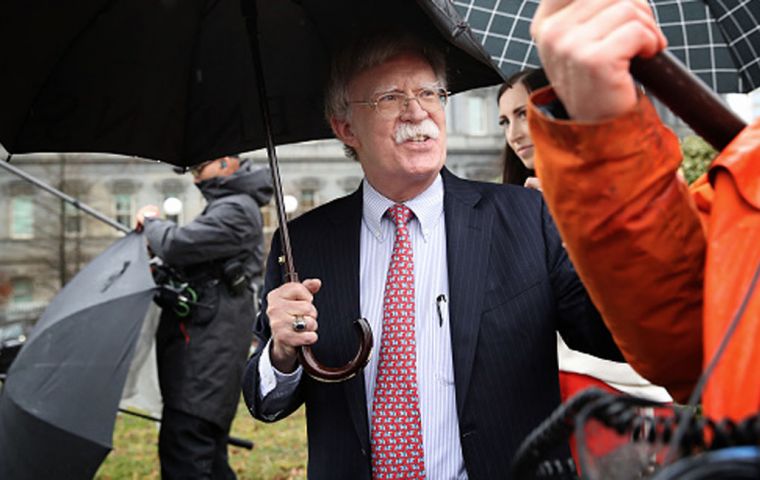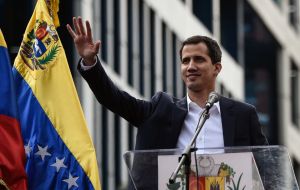MercoPress. South Atlantic News Agency
Maduro rejects elections but gives US diplomats 30 days to leave; Guaidó calls for protests on Wednesday and Saturday
 Bolton's warning comes days after the US and more than 20 other countries recognized Mr Guaidó as interim president
Bolton's warning comes days after the US and more than 20 other countries recognized Mr Guaidó as interim president  On Twitter, Mr Guaidó called for a “peaceful” two-hour strike to paralyse the country on Wednesday and a “big national and international rally” on Saturday.
On Twitter, Mr Guaidó called for a “peaceful” two-hour strike to paralyse the country on Wednesday and a “big national and international rally” on Saturday. The US has warned Venezuela that any threats against American diplomats or opposition leader Juan Guaidó will be met with “a significant response”. National Security Adviser John Bolton said any such “intimidation” would be “a grave assault on the rule of law”.
His warning comes days after the US and more than 20 other countries recognised Mr Guaidó as interim president. Meanwhile, Mr Guaidó has called for anti-government protests on Wednesday and Saturday.
The political crisis in Venezuela now appears to be reaching boiling point amid growing efforts by the opposition to unseat Mr Maduro. The president was sworn in for a second term earlier this month after an election marred by an opposition boycott and allegations of vote-rigging, triggering large protests.
On Sunday, Venezuela's top military representative to the US, Col José Luis Silva, defected from Mr Maduro's government, saying he recognised Mr Guaidó as president instead.
Later, Mr Bolton took to Twitter to reiterate Washington's position, warning others against any form of “violence and intimidation”. Cuba’s support and control over Maduro’s security and paramilitary forces are well known.
Any violence and intimidation against U.S. diplomatic personnel, Venezuela’s democratic leader, Juan Guiado, or the National Assembly itself would represent a grave assault on the rule of law and will be met with a significant response.
Also on Twitter, Mr Guaidó called for a “peaceful” two-hour strike to paralyse the country on Wednesday and a “big national and international rally” on Saturday.
On Saturday, several European countries including Spain, Germany, France and the UK said they would recognise Mr Guaidó as president if elections were not called within eight days.
But Mr Maduro has rejected this, saying the ultimatum must be withdrawn. “Venezuela is not tied to Europe. This is complete insolence,” he told CNN Turk on Sunday.
Mr Maduro added that he was ready to “engage in comprehensive dialogue” with those who opposed his presidency, and that he had sent Donald Trump “many messages”, but that he thought the US president “despises us”.
He later appeared at a military exercise in Venezuela's central state of Carabobo, where he called for “union, discipline and cohesion” to overcome what he described as an “attempted coup d'etat” by Mr Guaidó.
Mr Maduro broke off relations with the US last Thursday over the country's support for Mr Guaidó, and ordered US envoys to depart Venezuela within 72 hours.
However on Saturday evening, as the deadline was due to expire, Venezuela's foreign ministry said it would withdraw the expulsion order, and instead allow 30 days for the two sides to set up “interest offices” in each others' countries.
Interest offices are used when countries do not have formal diplomatic relations, but want to have a basic level of contact to represent their interests. Washington has previously said it does not recognise Mr Maduro's authority to order its diplomats out.
Meanwhile, Mr. Guaidó told the Wshington Post that he was in talks with “sympathetic military” officials in Venezuela with the aim of building support for his presidency.
However president Maduro still has the backing from Russia, China, and Turkey, while Mexico has called for negotiations.
At a UN Security Council meeting on Saturday, Russia accused Washington of plotting a coup. However, more than a dozen Latin American countries and Canada have backed Mr Guaidó as president.
Venezuela is in economic and humanitarian crisis, hyperinflation and shortages of basic essentials has hit its population hard and caused millions to flee. Mr Maduro has faced internal opposition and ongoing international criticism for his human rights record and handling of the economy.
He was re-elected to a second term last year - but the elections were controversial, with many opposition candidates barred from running or jailed. Supreme Court judge Christian Zerpa fled to the UN in January, telling journalists the election “was not free and competitive”.




Top Comments
Disclaimer & comment rules-

-

-

Read all commentsHas anyone been seeing all the “official declarations” by Madoro?
Jan 29th, 2019 - 09:47 pm 0The bus driver has plenty of reason to be paranoid right about now, which is a big change from all his phony yells about threats in the past.
No wonder he's going bonkers with the announcements, must be soiling his pants.
And yet another “Populist Bus Driver” remains silent. “Hasta siempre, Mentiroso...”
Jan 30th, 2019 - 06:11 am 0The Bottom-Line is CREDIBILITY:
Feb 04th, 2019 - 03:19 pm 0https://www.washingtonpost.com/outlook/2019/02/01/if-youre-still-working-trump-his-stink-wont-ever-wash-off/?noredirect=on&utm_term=.68d14a70df0e
Commenting for this story is now closed.
If you have a Facebook account, become a fan and comment on our Facebook Page!